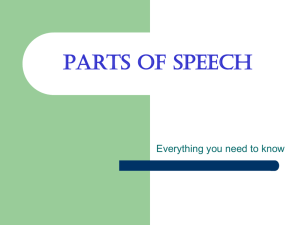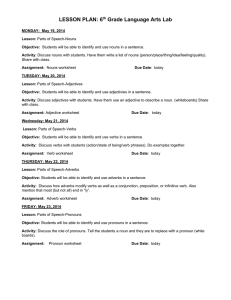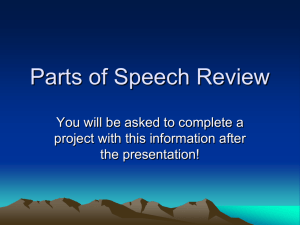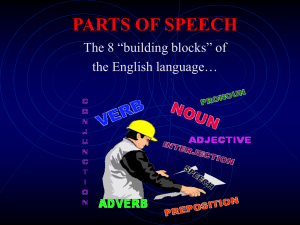Grammar Voyage
advertisement
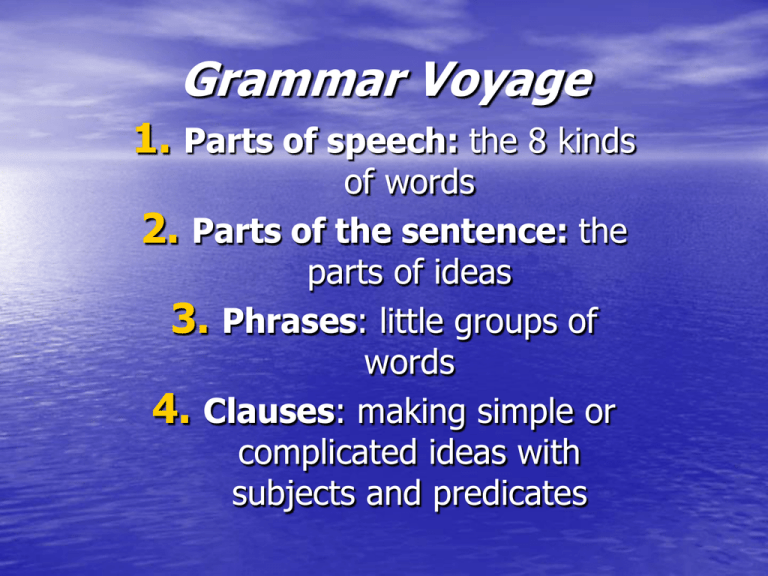
Grammar Voyage 1. Parts of speech: the 8 kinds of words 2. Parts of the sentence: the parts of ideas 3. Phrases: little groups of words 4. Clauses: making simple or complicated ideas with subjects and predicates Grammar Voyage: Part 1 1. The names of the eight kinds of words: noun adj prep verb Pron . conj adv interj 1. NOUNS • Nouns name things • Proper nouns name specific things, and are capitalized (like Madagascar). • Common nouns name general things, and are not capitalized (like horizon). • A noun naming one thing is singular (like tide). • A noun naming more than one thing is plural (like shores). 2. PRONOUN • The word pronoun means “for the noun.” • Pronouns are short words that replace the noun. • SUBJECT pronouns: I you he she it we you they • OBJECT pronouns: me you him her it us you them • We use demonstrative pronouns to demonstrate. this that these those This is a good harbor. • We use possessive pronouns to show possession. my you his her its our their The Nostromo is my boat. • We use interrogative pronouns to interrogate. who whose whom which what Who stowed the grub today? It’s versus its • The word its is a possessive pronoun; it’s is a contraction of it is. The bee found its hive; it’s a good thing, too. Antecedents • Ante – before, cede – go • The antecedent is the noun that goes (cede) before (ante) the pronoun; it is the noun the pronoun replaces. First Jose laughed, then he smiled. 3. ADJECTIVES • With adjectives, we can use one noun to refer to hundreds of different things. • Adjectives let us modify nouns. • To modify a thing is to adjust it or to change it. raging sea, stormy sea, rolling sea, profound sea, silent sea, undulating sea, quiet sea, serene sea, placid sea • You ADD the adjective to the noun and it modifies the idea of the noun! • Adjectives are always with nouns or pronouns. • Anything an adjective modifies is by definition a noun or pronoun. • With adjectives, you don’t have to know thousands of different nouns for all the kinds of seas. You just learn sea, and the modify with adjectives. • Adjectives also modify pronouns: She is adventurous. He is sunburned. It is stormy. It is vast. Paolo stood stolid on the bridge of the Hampstead, watching the great seas rising ahead. The storm had lasted three long days, and Zanzibar’s safe harbor seemed far away. His mind filled with adjectives that described the storm, the wind, the waves… crashing, monstrous, raging, furious, roaring, dark, chaotic, grotesque, churning, rising, mountainous, black, tempestuous, howling, tedious, dangerous ARTICLES • The three adjectives the, a, and an are called the articles. the freighter a freighter an old freighter • The adjective the is called the definite article, and adjectives a and an are called indefinite articles. These are great names that really make sense. If I say that I want to catch a freighter to Lisbon Then it could be any freighter; I’m not being definite. I’m being indefinite. But if I say I want to catch the freighter to Lisbon Then that is a definite, specific freighter. They are very logical names. Every one of our ideas, every sentence, has two sides: what it’s about what it’s about what we’re saying about it what we’re saying The Maggie Marshall puffed up the river. VERB • When we say something about a noun or pronoun, we always use a special kind of word called a verb. • Every sentence has a verb! • The verb is the only part of speech that can be found in every single sentence. VERB • The verb is about the noun or pronoun, and it says that the noun or pronoun DOES something or IS something. DOES, or IS. Ahab struck the mast. Ahab was silent. ACTION VERBS • Most verbs are action verbs. • They show the noun or pronoun doing something. The oil tanker approached the pier. She sailed toward the marina. The captain perplexed the crew. Mona secured the line to the cleat. The quiet Ganges flowed past Kanpur. Do you see why these are called action verbs? LINKING VERBS • A linking verb says the subject IS something. • With a linking verb, the subject isn’t doing something to something else. Now the subject IS the other thing. If we say, “John Silver is a pirate” then John Silver and pirate are the same person! That is not like John Silver saw a pirate. In math, we say that 2 + 2 = 4. This is an equation, since each side of the equals sign equals the other side. A linking verb is like an equation. John is a pirate. John = pirate. • Some linking verbs sound like action verbs: The harbor looks beautiful. You smell good. • Forms of be linking verbs: be, am, is, are, was, were, been, being • Linking verbs that express condition: appear, become, feel, grow, look, remain, seem, smell, sound, taste VERB TENSE • Verbs do more than describe action. They also tell when the action took place—now (present tense), before (past tense), or in the future (future tense). • There are six verb tenses: three regular tenses and three perfect tenses that use to have as a helping verb. VERB TENSES Present: Sally hoists the sail. Past: Sally hoisted the sail. Future: Sally will hoist the sail. Present perfect: Sally has hoisted the sail. Past perfect: Sally had hoisted the sail. Future perfect: Sally will have hoisted the sail. VERB AGREEMENT • Verbs must reflect the nouns’ number: if the noun is singular, the verb must be singular too. The boat is at anchor in the cove. The boats are at anchor in the cove. The boat was at anchor in the cove. The boats were at anchor in the cove. Nouns often make their plurals by adding an s, but verbs don’t. Each sentence must be either about one thing or about more than one thing, and if the noun is singular but the verb is plural, then we can not tell! The number must be manifest. The boats is at anchor. The boat are at anchor. In these sentences, we cannot tell whether the person saw a boat or some boats. • The number agreement only functions in some tense situations. If we were describing a future event, then the verb would not change form, but would use the same form for both singular and plural! The boat will be at anchor in the cove. The boats will be at anchor in the cove.

